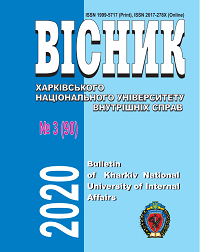General Theoretical Characteristics of the Institution of Disciplinary Liability in Labor Law
DOI:
https://doi.org/10.32631/v.2020.3.08Keywords:
discipline, labor discipline, liability, disciplinary liability, labor law.Abstract
It has been specified that disciplinary liability should be understood as the employee’s obligation to stand surety to the employer, who is endowed with the disciplinary authority, for his violation of labor discipline in the form of non-performance or improper performance of his labor duties due to the employee and as the result, bear negative consequences provided by labor law.
It has been substantiated that the purpose of disciplinary liability has two aspects: the first is to ensure proper discipline in order to ensure the further effective functioning of the enterprise (organization, institution, etc.), and therefore its presence is an important preventive measure of disciplinary offenses’ commission. The second aspect is to apply negative measures to the offender, which, in turn, allows to restore the violated labor (including official) rights, to avoid the negative consequences of the offense and to educate the employee in the spirit of legality and discipline.
The main tasks of disciplinary liability include: to ensure the compliance with labor discipline by each employee in performing their duties; to create comfortable working conditions for each employee (state official); to create a favorable, friendly atmosphere in the team; to punish the employee who committed a disciplinary offense; to prevent situations, when an employee may commit a disciplinary offense.
It has been argued that the functions of disciplinary liability are: educational, punitive, protective, stimulating, renewing, informative, preventive and staffing.
It has been generalized that the essence and content of disciplinary liability as an institution of labor law are as follows: first of all, despite the fact that disciplinary liability, is although a kind of legal liability, it has its own characteristics inherent in labor law; secondly, the employer is not obliged to apply penalties to the violator of labor discipline, such application is his right; thirdly, the employee, in turn, is responsible to the employer and not to the state for non-compliance with labor discipline, i.e. for culpable improper performance of obligations imposed by the employment contract.
Downloads
References
Duravkina N.I., 2011. Legal regulation of legal liability of subjects of labor law in a market economy [Pravove rehuliuvannia yurydychnoi vidpovidalnosti subiektiv trudovoho prava v umovakh rynkovoi ekonomiky]. Abstract of Ph.D. dissertation. Volodymyr Dahl East Ukrainian National University.
Podorozhnii Ye.Yu., 2015. To the problem of characteristics of labor discipline: its essence and purpose [Do problemy kharakterystyky trudovoi dystsypliny: yii sutnist ta pryznachennia]. Mytna sprava, No. 1, pp. 278-283.
Shemshuchenko Yu.S. (ed.), 1998. Legal encyclopedia [Yurydychna entsyklopediia]: in 6 vols. Vol. 2. Kyiv: Ukrainska entsyklopediia.
Inshyn M.I., Matsiuk A.R., Sotskyi A.M. and Shcherbyna V.I., 2012. Course of comparative labor law [Kurs porivnialnoho trudovoho prava]. Kharkiv: NikaNova.
Kartuzova I.O., 1999. Disciplinary liability of civil servants [Dystsyplinarna vidpovidalnist derzhavnykh sluzhbovtsiv]. Abstract of Ph.D. dissertation. Odesa State Law Academy.
Zhernakov V.V. (ed.), 2012. Labor law [Trudove pravo]. Kharkiv: Pravo.
Sereda V.V., 2014. Disciplinary responsibility: concepts, principles and types [Dystsyplinarna vidpovidalnist: poniattia, pryntsypy ta vydy]. Unìversitetsʹkì naukovì zapiski (Hmelʹnicʹkij unìversitet upravlìnnâ ta prava) – University Scientific Notes, Kmelnytskyi, No. 1, pp. 18-25.
Il`ichev L.F., Fedoseev P.N., Kovalev S.M. and Panov V.G. (eds), 1983. Philosophical encyclopedic dictionary [Filosofskii entsyklopedicheskii slovar`]. Moscow: Sovetskaya entsyklopediya.
Kutsenko V.I., 1984. Social problem: genesis and solution (methodological analysis) [Obshchestvennaya problema: genezis i reshenie (metodologicheskii analiz)]. Kiev: Naukova dumka.
Klymkov V.O., 2010. Organizational and legal bases of activity of special body on bankruptcy issues [Orhanizatsiino-pravovi zasady diialnosti spetsialnoho orhanu z pytan bankrutstva]. Ph.D. dissertation. Kyiv National University of Internal Affairs.
Bostan S.K., Husariev S.D., Parkhomenko N.M. et al., 2013. Theory of state and law [Teoriia derzhavy i prava]. Kyiv: Akademiia.
Hida Ye.O. (ed.), 2011. Theory of state and law [Teoriia derzhavy i prava]. Kyiv: FOP Lipkan O.S.
Zaichuk O.V. and Onishchenko N.M. (eds), 2006. Theory of state and law. Academic course [Teoriia derzhavy i prava. Akademichnyi kurs]. Kyiv: Yurinkom Inter.
Plishkin V.M., 1999. Theory of management of law-enforcement bodies [Teoriia upravlinnia orhanamy vnutrishnikh sprav]. Kyiv: Natsionalna akademiia vnutrishnikh sprav Ukrainy.



